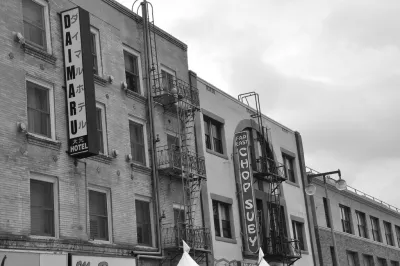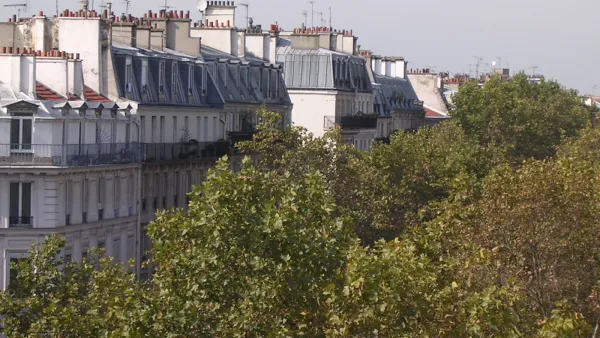Little Tokyo in Los Angeles was selected to be part of the EcoDistrict Target City program. Global Green is excited to be part of this collaborative effort to promote neighborhood scale sustainability and further the concept of "Mottainai."

Thinking sustainably usually means taking the long view, so it is inspiring to see the rapid progress occurring in the burgeoning EcoDistrict movement for district-scale urban revitalization. For the past several years, the Green Urbanism Program at Global Green has been exploring the potential for working at the neighborhood or district scale to accelerate and increase the transformation impacts of green design. Through a variety of green affordable hosing projects, Sustainable Neighborhood Assessments, and LEED for Neighborhood Development certified plans, we are moving towards realizing how "green urbanism"—the practice of creating communities mutually beneficial to humans and the environment—can be manifest.
EcoDistricts' unique contribution to the sustainability conversation is the recognition that green design strategies, standards, and techniques are a part of a larger, more complex picture. Affecting change in a community also means identifying and nurturing local organizations that can help shape the local vision and stay the course in implementation. I saw the importance of this perspective earlier this year as a facilitator at the EcoDistricts Incubator: One of the main insights of the group I worked with was the need to clarify their governance model before launching into revitalization projects. This helps ensure that each organization and individual is able to contribute most effectively to realizing the projects.
Recognition of the critical role played by community organizations is a core aspect of EcoDistricts' Target Cities program, recently announced at the Clinton Global Initiative Denver meeting. A two-year partnership with nine development projects in seven North American cities, Target Cities aims to accelerate district-scale community regeneration and to create replicable models for urban revitalization. The projects are located in Atlanta, Boston, Cambridge, Denver, Ottawa, Washington, D.C, and, most exciting for me, Los Angeles.
Little Tokyo, a 20-acre area in Downtown Los Angeles, is the specific neighborhood selected to represent Los Angeles. Global Green, along with a number of other non-profit and community development groups, has collaborated with Little Tokyo and EcoDistricts for the past year to help shape the overall vision and identify how to implement innovative concepts by bringing our national expertise in green urbanism to project. This includes our participating in the community charrette last October, contributing to an analysis of integrated infrastructure opportunities, and serving as an advisor to Little Tokyo Service Center staff.
We are excited to be able to continue our involvement as a supporter and contributor to the Little Tokyo effort. Being part of the national pool of Target Cities will both help bring best practices to Los Angeles, and also enable the sharing of innovative conceptual work being done in Little Tokyo, built around the cultural and philosophical concept of "Mottainai"—roughly translated to "do not destroy (or lay waste to) that which is worthy.”
Fostering a shift to sustainability takes patience and perseverance, so it is deeply rewarding and exciting to see the significant progress made in both the EcoDistricts movement and on the ground in Little Tokyo. I expect that the Target Cities partnership and the efforts in Little Tokyo will provide a catalyst for future district-scale green urbanism projects in Southern California and nationally.

Analysis: Cybertruck Fatality Rate Far Exceeds That of Ford Pinto
The Tesla Cybertruck was recalled seven times last year.

National Parks Layoffs Will Cause Communities to Lose Billions
Thousands of essential park workers were laid off this week, just before the busy spring break season.

Retro-silient?: America’s First “Eco-burb,” The Woodlands Turns 50
A master-planned community north of Houston offers lessons on green infrastructure and resilient design, but falls short of its founder’s lofty affordability and walkability goals.

Test News Post 1
This is a summary

Analysis: Cybertruck Fatality Rate Far Exceeds That of Ford Pinto
The Tesla Cybertruck was recalled seven times last year.

Test News Headline 46
Test for the image on the front page.
Urban Design for Planners 1: Software Tools
This six-course series explores essential urban design concepts using open source software and equips planners with the tools they need to participate fully in the urban design process.
Planning for Universal Design
Learn the tools for implementing Universal Design in planning regulations.
EMC Planning Group, Inc.
Planetizen
Planetizen
Mpact (formerly Rail~Volution)
Great Falls Development Authority, Inc.
HUDs Office of Policy Development and Research
NYU Wagner Graduate School of Public Service




























